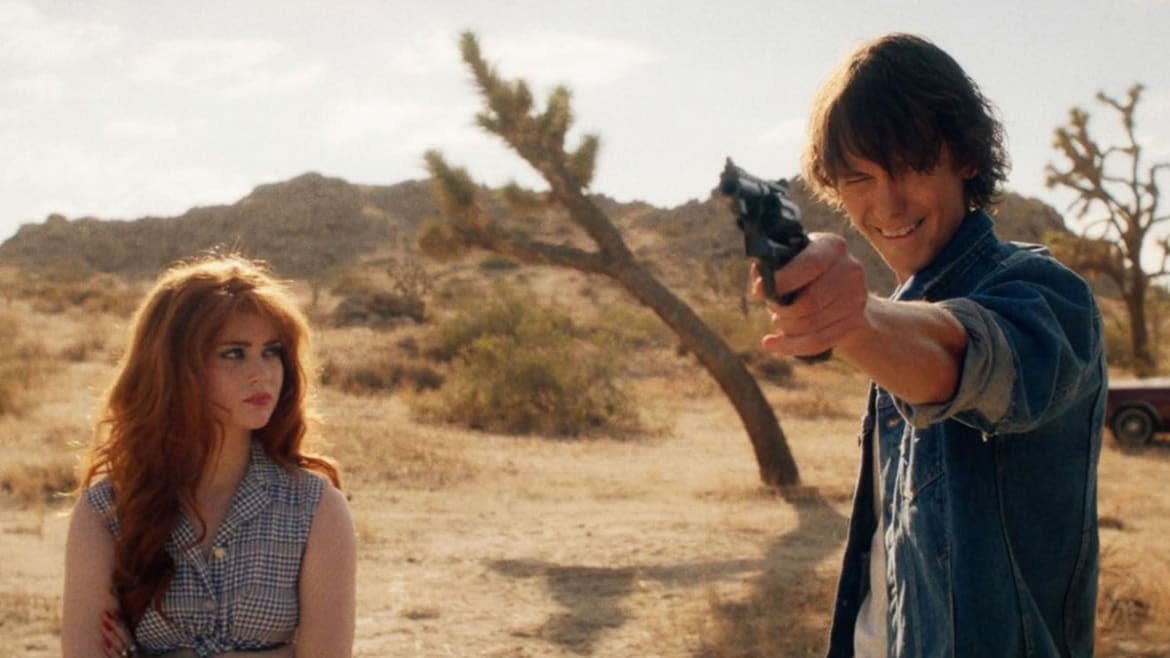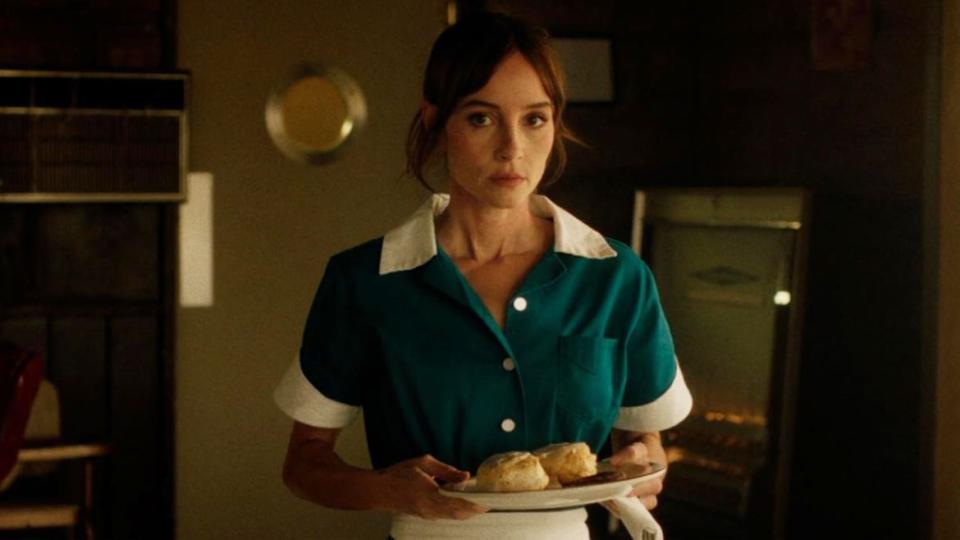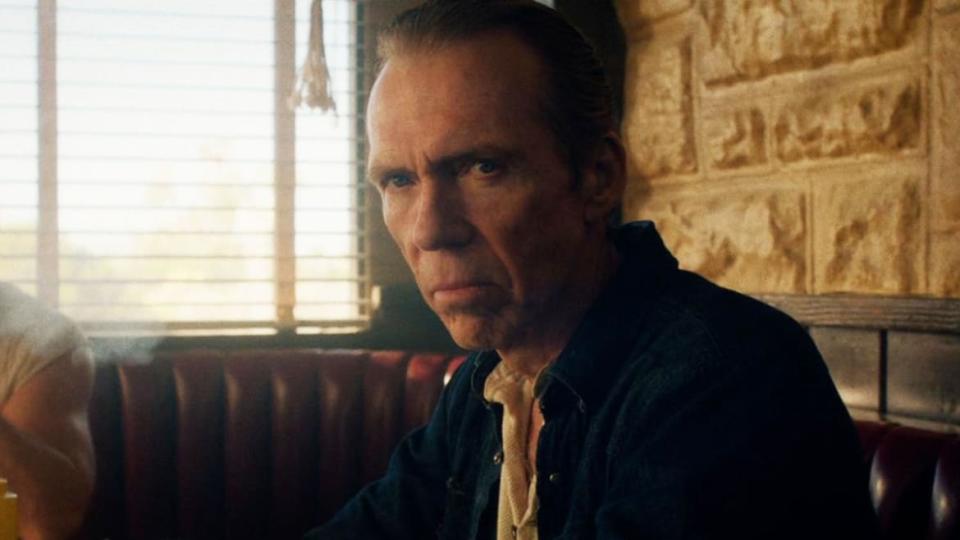‘Last Stop in Yuma County’: The Thrilling Film Noir You Absolutely Shouldn’t Miss

It often takes mere minutes for a director to demonstrate whether they know what they’re doing, and that’s unquestionably true with regards to The Last Stop in Yuma County.
From its tantalizing framing and camerawork to its poised, anxiety-laced pacing, performances, and tone, writer/editor/director Francis Galluppi announces from the outset of his feature debut that he’s in complete, confident command of his material, and that self-assurance never wavers throughout the course of his expert neo-noir, which is in theaters and on VOD May 10. A tense, fatalistic saga of bad luck and worse decisions, it’s a throwback that feels as fresh and alive as its predecessors did decades ago. Not to be missed, it stands as one of the most welcome surprises of this moviegoing year.
Never stagey despite confining the majority of its action to a single location, The Last Stop in Yuma County sets up shop at a remote pit stop on a road cutting through the hot, dusty, windswept Arizona desert. At this gas station, an unnamed man (Jim Cummings) pulls up in a little yellow Toyota Corona in need of gas. Unfortunately for him and those who’ll follow in his wake, he learns from proprietor Vernon (Faizon Love) that the pumps are dry, the next filing spot is 100 miles away, and the refueling truck won’t be around until later in the day.
Consequently, Vernon suggests that the guy bide his time in the adjacent diner. Cummings’ protagonist initially opts to just sit in his car, during which time he hears on the radio about a nearby bank robbery executed by thieves in a beat-up green Pinto. Yet after a few minutes of that—and watching waitress Charlotte (Jocelin Donahue) get dropped off at the eating establishment by her sheriff husband Charlie (Michael Abbott Jr.)—he heads inside and takes a seat in a booth.

Jocelin Donahue
Alone with Charlotte, Cummings’ stranger reveals that he’s a knife salesman, and his nervous demeanor suggests that he’s not a very good one—not to mention that he’s keeping some underlying secret close to the vest. Whatever he’s hiding, however, takes a backseat to more pressing issues, the most urgent of which is the arrival of Beau (Richard Brake) and Travis (Nicholas Logan), the latter a sweaty young hothead and the former a composed, intense baddie. These are the bank robbers, and since they too can’t get the gas they need to continue making their getaway, they join Cummings’ everyman (who has a daughter named Sarah that he’s eager to see) in the diner.
In short order, the salesman identifies their car as the one being discussed on the news. Still, Beau is a perceptive sort of villain, and before Charlotte can complete a call to Charlie, he’s cocking his gun, choking her to the point of death, and cutting the phone cord to prevent any further interruptions to their morning.
‘Dark Matter’ Is Your Next Head-Spinning Binge Obsession
With Beau and Travis’ cards now out on the table for the salesman and Charlotte to see, The Last Stop in Yuma County ratchets up the complications by having additional motorists join the quartet in the diner, all of them annoyed by the refueling delay and the broken air conditioner that’s turned the restaurant into a sauna. First, it’s an older couple (Gene Jones and Robin Bartlett), then a gee-whiz police deputy (Connor Paolo), and finally a Native American local (Jon Proudstar) and a pair of young drifters, Miles (Ryan Masson) and Sybil (Sierra McCormick), who dream of the outlaw life—specifically, one modeled less on Bonnie and Clyde than on Badlands. Sitting at the diner’s counter, and aware that the bank robbers are in the place, Sybil remarks that Cummings’ salesman “kinda looks like that crossdresser from Psycho,” and the comment proves amusingly apt on multiple levels, even if that’s not immediately apparent.
The Last Stop in Yuma County doesn’t make any more overt references to its big-screen forefathers but its blood runs film-noir black. No matter how much its characters attempt to logically manage their situation, unforeseen impediments and unfortunate developments routinely compound their troubles. Galluppi’s script is a methodical ticking time bomb, winding up its various characters and waiting for them to blow. However, he wisely postpones fireworks for as long as possible, the better to maximize both the proceedings’ edge-of-your-seat suspense and the jarring thrill of his payoff. Conveying much through quick cutaways to key details, close-ups of his actors’ expressive faces, and compositions that lay out the geography of his setting and those who inhabit it, the director orchestrates his drama with the skill and grace of a born craftsman.
He also knows how to cast a film. Cummings remains one of indie cinema’s most talented leading men, and in The Last Stop in Yuma County, he only hints at the buffoonish volatility that marked his prior turns in Thunder Road and The Wolf of Snow Hollow; instead, he embodies his salesman as a tremulous mystery who might capable of nothing or everything.

Richard Brake
A late sequence in which Galluppi’s camera affixes itself to Cummings’ POV as he thinks through his options is a terrific example of an actor and director working in perfect harmony. For pure showmanship, it’s only exceeded by a preceding sit-down between Donahue’s Charlotte, Cummings’ nobody, and Brake’s Beau that finds the criminal momentarily dropping his placid façade to expose his terrifying true self. That quick, transformative flash is so startling that it almost resonates as a special effect, and its impact lingers for minutes afterwards, making us not just comprehend Beau’s viper-like dangerousness but feel it.
Energized by a Matthew Compton score of simmering ominousness, The Last Stop in Yuma County builds to its finale with the same precision that typifies its every move. Rather than getting cute or losing his nerve, Galluppi embraces his chosen genre’s bleak heart right to the bitter end, staging his concluding face-off amidst the vast plains, where the sand whips through the air, the blue sky looms large overhead, and escape is a fleeting fantasy. A fitting companion piece to everything from Robert Siodmak’s 1946 The Killers to James Foley’s 1990 After Dark, My Sweet, it’s a faithful bit of noir nastiness that—like Charlotte’s rhubarb pie—is to die for.
Get the Daily Beast's biggest scoops and scandals delivered right to your inbox. Sign up now.
Stay informed and gain unlimited access to the Daily Beast's unmatched reporting. Subscribe now.


